Kweichow Moutai: does sell-off signal China’s beleaguered stock market is about to turn around?
- Over the past decade, major declines in the shares of liquor giant Kweichow Moutai have presaged significant gains for the Chinese stock market benchmark
- The stock is an investor favourite due to the company’s solid earnings growth history and track record of regular dividend payouts

The latest sell-off in Chinese bellwether stock, Kweichow Moutai, is being interpreted by analysts as a harbinger of a market bottom after shares in the liquor giant posted their biggest decline in almost a year.
Over the past decade, major declines in the stock have been followed by gains for the benchmark. The CSI 300 Index rose almost 6 per cent in the 12 months that followed a 19 per cent slump in Kweichow Moutai’s shares in September 2013. The benchmark gained 23 per cent over the ensuing year after the stock lost a quarter of its value in October 2018. In the most recent occurrence, the CSI 300 rallied 15 per cent in the six months that followed Kweichow Moutai’s 23 per cent slump last October.
“Historically speaking, it’s a kind of prerequisite for the market to form a bottom,” said Wang Chen, a partner at Xufunds Investment Management in Shanghai. “Sell-offs first start with companies with mediocre fundamentals and then unfold to extend to the most popular trades. When that happens, that means selling pressure is fading and is nearing an end, and the market bottoms out.”
Kweichow Moutai, which produces China’s most famous baijiu liquor under the same brand-name, is an investor favourite due to its solid earnings growth history and track record of regular dividend payouts. It is the second-most valuable stock in China’s onshore markets, with a capitalisation of 2.07 trillion yuan (US$282 billion).
Shares of the distiller tumbled 5.7 per cent on Thursday in Shanghai for its steepest decline in nearly a year, sending analysts scrambling to explain what went wrong. Before that, the stock had been largely flat in the year-to-date, outperforming the benchmark CSI 300 Index’s 6.7 per cent slide.
While some said investors were bringing the company’s valuations in line with the broader market, others said it was a proxy for the China growth story.